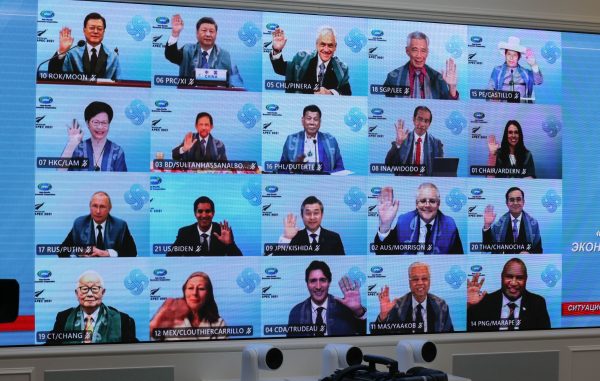The APEC summit chaired by New Zealand came at the end of a busy summit season for leaders on the heels of the Rome G20 meeting and the Glasgow COP26 summit, and before that the East Asia Summit that was hosted virtually by Brunei. Its time in the headlines will be further squeezed by the sudden announcement of a virtual bilateral summit between US President Joe Biden and Chinese President Xi Jinping on Monday, the first since President Biden took office.
It would be easy to dismiss the non-binding economic forum in the Asia Pacific between these major events that command the attention of the world, but that would miss the important and enduring contribution that APEC makes.
Chaired by New Zealand Prime Minister Jacinda Ardern, this year’s APEC summit introduced an explicit climate change lens that had not existed previously and that will shape discussions at future APEC meetings. The leaders committed to stop the increase in fossil fuel subsidies — even as countries look to boost economic recovery from the pandemic-induced recession — and facilitate trade in environmentally friendly goods and technology.
There was also agreement to boost COVID-19 vaccine manufacturing and supply. Similar pledges have been made in the Quad summit between Australia, India, Japan and the United States, and in the G20 grouping, and they all need to be put into action. But APEC has a track record of delivery through practical steps and their agreement to facilitate this through the transfer of technology, and elimination of export restrictions on medical goods goes further. As will the agreement to cooperate on COVID-19 testing and vaccine passports — important for kick-starting people movement as borders reopen.
Commitments on shared challenges backed up by step-by-step practical economic cooperation in the Asia Pacific reinforces multilateral action and contributes to the management of strategic and geopolitical issues. Given the biggest geopolitical fault line globally is between China and the United States, collaborative progress in the Asia Pacific is essential to resolving some of the biggest global challenges.
Global cooperation has become much harder with strategic competition between China and the United States. Producing a non-binding APEC leaders’ statement is no longer an easy outcome that is automatically guaranteed, after hosts Papua New Guinea failed to in 2018 (largely because of ham-fisted Australian diplomacy). And the G20 has been totally missing in action during the pandemic.
As Peter Drysdale argues in our feature article this week, ‘the post-war global economic order that has shaped relationships between the United States and Asia — and underpinned the prosperity and security of Asia — is under strain. Small and middle powers like New Zealand and Australia’, he explains, ‘rely on the multilateral order as much as they do their alliance relationship with the United States as a pillar in national security, anchoring their integration into the dynamic regional Asian economy’.
With China and the United States locked in strategic competition, small and middle powers need to work in coalition to protect their interests and shape the behaviour of the major powers. Major powers rarely consider the spillovers from their actions on smaller countries, even if they are allies. But coalitions of small and middle powers can make a difference and that’s where groupings like APEC present a crucial opportunity. Chinese exercise of raw economic muscle against Australia has seen other countries get behind Australia’s pushback in the WTO against China, even as China becomes a more important trading partner for almost every country.
As Drysdale reminds us, ‘APEC members stood firm against Trump at the Vietnam APEC Summit in 2017’. He says that ‘Auckland is an important step in bringing the Biden administration back into the fold, though it still plays by Trump managed-trade rules with China and in its settlement on steel and aluminium with Europe’.
APEC can make progress where the G20 can’t.
There are habits of cooperation between officials, business and experts in APEC — with 340 meetings taking place in the run up to the leaders’ summit. The two great powers are able to work through areas of common interest in a broader grouping. There is no automatic caucusing in APEC like there is in the G20, where the Europeans tend to work as a bloc. Coalitions are formed around issues of interest and ‘pathfinder’ groups proceed with initiatives without having to wait for more reluctant participants to join in.
Without economic cooperation, countries act in their own narrow self-interests and everyone is worse off. The temptation is to free ride on the efforts of others — let others cut emissions, keep markets open to foreign competition and avoid devaluing currencies. Without cooperation there’s no incentive to do the heavy lifting because you’ll likely be doing it alone.
The next decade may see more protectionism globally if the policy reaction to the Spanish flu of 1918 is any guide: after that, the last, major pandemic countries which had suffered more deaths from the flu raised barriers faster and higher. The breakdown in cooperative outcomes is a big part of the story of the interwar period and the Great Depression in the 1930s. It was also on display at the beginning of the pandemic when many countries blocked the export of personal protective equipment and food, exacerbating shortages.
APEC’s lead on economic cooperation will be crucial to the global response as the pandemic recovery plays out uncertainly and differently across the world. The foundations laid in the New Zealand APEC meetings offer the glimmer of real hope for better outcomes than we might otherwise expect.
The EAF Editorial Board is located in the Crawford School of Public Policy, College of Asia and the Pacific, The Australian National University.

